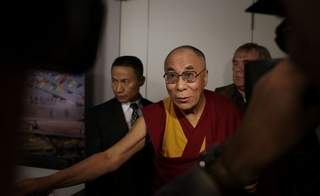The Politics of Reincarnation
by Melissa Liu and Sudip Mazumdar, Newsweek, Feb 20, 2011
New Delhi, India -- It’s probably best not to even try making sense of Beijing’s pronouncements on the 14th Dalai Lama and other Tibetan spiritual leaders: you’ll only make your head hurt. Last week the officially atheist Chinese government’s State Administration for Religious Affairs disclosed plans to enact a new law forbidding the 75-year-old Buddhist deity to be reborn anywhere but on Chinese-controlled soil, and giving final say to Chinese authorities when the time comes to identify his 15th incarnation.
 That might seem to pose a dilemma, given the exiled leader’s earlier promise that he will never again be reincarnated in Tibet as long as his homeland remains under China’s heel. Still, no one seems too concerned just now about the Dalai Lama’s next life.
That might seem to pose a dilemma, given the exiled leader’s earlier promise that he will never again be reincarnated in Tibet as long as his homeland remains under China’s heel. Still, no one seems too concerned just now about the Dalai Lama’s next life.
Instead, attention has focused on an all-too-worldly fracas over the finances of the 25-year-old Tibetan-born holy man who seems most likely to assume leadership of the exile community after the current Dalai Lama’s death: the 17th Karmapa Lama.
It began in late January when a random police check found a car in northern India hauling roughly $200,000 in Indian currency.
Investigators followed the trail to the Karmapa’s monastery in the Indian town of Dharamsala, where they confiscated trunkloads of cash, reportedly amounting to $1.6 million, including more than $100,000 in Chinese currency—a discovery that immediately revived old suspicions in India’s intelligence community that the Karmapa is a Chinese spy. Beijing didn’t help calm the situation when it quickly issued a denial that the Karmapa was any such thing.
Indian authorities have kept a close eye on the Karmapa ever since he fled Chinese-occupied Tibet in the winter of 1999–2000. Born to a nomadic Tibetan family in 1985, Ogyen Trinley Dorje was identified at the age of 7 as the reincarnation of the 16th Karmapa and taken to a monastery to be raised under constant surveillance by Chinese security forces, forbidden to leave the country even briefly. When his India-based religious tutor was barred from Tibet, the boy staged a harrowing escape via SUV, horseback, and helicopter, arriving in Dharamsala by taxi in early January 2000.
In the years since, the Karmapa has refrained from criticizing the Chinese government—in sharp contrast to the Dalai Lama’s blunt denunciations since his escape from occupied Tibet in 1959—and Beijing has never admitted that the Karmapa has left for good. The Chinese say he’s merely on a quest to retrieve a black hat said to have magical powers and other artifacts currently housed at a monastery in the eastern Himalayan state of Sikkim. The lack of recrimination has only heightened suspicions among some Indian intelligence operatives who still seem unable to accept that a mere 14-year-old could elude Chinese security forces and survive such a trek across snow-choked Himalayan passes. “There are people in the shadows who are suspicious of China and deeply uncomfortable with the Tibetan exiles’ perceived long-term drift towards accommodation with Beijing,” says Robert Barnett, a Tibetologist at Columbia University.
The politics of reincarnation has always been a treacherous area in Tibet. In past centuries, rival claimants were often in danger of assassination, and after the Dalai Lama gave his blessing to a Tibetan boy as the 11th Panchen Lama in 1995, the child disappeared and Chinese authorities installed another youngster in his place. The man generally recognized as the 17th Karmapa himself has at least two rivals for the title, although his claim is supported by both the Dalai Lama and Beijing—and most ordinary Tibetans. Still, to prevent possible unrest, Indian authorities have barred all claimants from the monastery where the black hat is kept.
Followers of the two rivals have clashed violently in the past.
As for the mysterious trunkfuls of cash, the Karmapa’s financial representatives stuck to their story that the money had all been donated by his devout followers—including many inside China. And by last week Indian investigators at last conceded that they were telling the truth. “I’ve seen Chinese society ladies swooning all over him,” says Jamyang Norbu, a U.S.-based author and blogger. “This translates into big money.” (Any inclination to celebrate the Karmapa’s exoneration was dampened by news that the Dalai Lama’s 45-year-old nephew had been struck and killed by an SUV while engaged in a 300-mile “Free Tibet” hike in Florida.)
Nevertheless, the uproar was no more than a tame affair compared with what’s sure to ensue when the 14th Dalai Lama finally moves on. He’s said he might come back as a woman, or he might not come back at all. The one certainty is that he won’t go quietly.

 That might seem to pose a dilemma, given the exiled leader’s earlier promise that he will never again be reincarnated in Tibet as long as his homeland remains under China’s heel. Still, no one seems too concerned just now about the Dalai Lama’s next life.
That might seem to pose a dilemma, given the exiled leader’s earlier promise that he will never again be reincarnated in Tibet as long as his homeland remains under China’s heel. Still, no one seems too concerned just now about the Dalai Lama’s next life. 